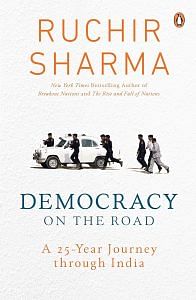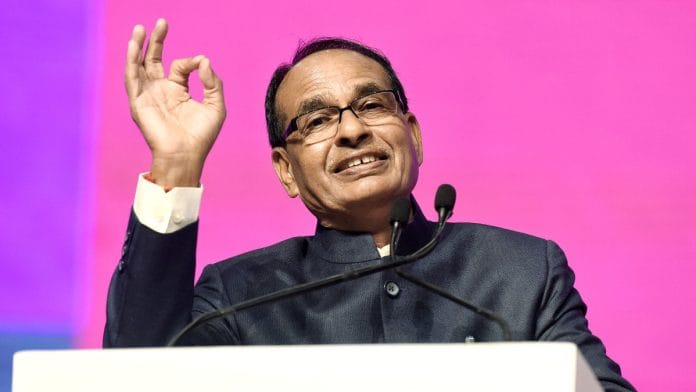State Assembly Elections, Madhya Pradesh, November 2018
We had seen the Modi wave take shape in the state elections of late 2013, when we followed the winning BJP campaigns in Madhya Pradesh and Rajasthan, then crest in his crushing general election victory six months later. In late 2018, these two states were going to the polls along with Chhattisgarh, Telangana and Mizoram, and were again seen as a test of Modi’s prospects in the general elections the following summer.
We headed first to Madhya Pradesh and the sprawling Jehan Numa Palace Hotel in Bhopal. The capital city had impressed us as one of India’s most beautiful cities when we were last here a decade earlier and it had improved since, with a new airport, wider streets, and water jet fountains showering the largest of its fourteen lakes. Once known as the Upper Lake, it had been rechristened as part of India’s ongoing campaign to replace names from the colonial and Mughal eras. It was now called Bhoj Tal, after tenth-century Hindu ruler Raja Bhoj, whose image and name were plastered all over the city.
The Jehan Numa was now the political nerve centre of Madhya Pradesh, the hotel where all the big political and media names congregated. At breakfast the first morning we met with half a dozen local newspapers and TV editors, who told us that BJP Chief Minister Shivraj Singh Chouhan had continued to build on his reputation as the mild-mannered ‘man next door of Indian politics’. On our 2013 trip, Chouhan had been positioning himself as the un-Modi of the BJP and Madhya Pradesh as a featherbed for warm Hindu– Muslim relations and generous welfare schemes. Since then he had followed up with a raft of new offerings for everyone from newborns to widowers, young entrepreneurs to priests, even a promise to build a new pukka home for every poor family in Madhya Pradesh within four years. The editors told us that Chouhan’s supporters had taken to calling him ‘Mama’, or uncle. And Chouhan would tell them, ‘Mama will protect you.’
Also read: Modi turned obsolete institutions into modern-day digital platforms. Impact most visible in J&K
Chouhan did, however, face one big handicap. After three terms in power he was testing the limits of Indian patience with incumbents, and throughout our trip in Madhya Pradesh we would hear voters calling for ‘badlav’ or change, the same demand we had heard in West Bengal in 2011 and other states, albeit in different languages. In 2013, the BJP had won 165 of the 230 state assembly seats, giving Chouhan an overwhelming majority in the assembly, but it was clear that he was in for a tougher fight this time—and that a defeat for Chouhan would be a setback for the party’s national leadership, whether they admitted it or not. When we heard that Modi’s home minister, Rajnath Singh, was staying in a suite at the Jehan Numa, we went up and found him, and he breathed not a word of doubt about BJP prospects, even inviting us to cut a celebratory cake with him when the BJP victory was announced.
The sense that popular sentiment was turning against the BJP grew stronger when we left Bhopal for the bellwether constituency of Hoshangabad, 75 kilometres south. Since there were only two serious contenders in Madhya Pradesh, the BJP and the Congress, the swing vote in MP was relatively easy to track, and Hoshangabad had voted with the winner in the last seven elections. Fanning out in groups of three or four we spoke to about fifty voters over the course of an hour in the main market of Hoshangabad, including about ten who were switching their vote—nearly all of them from the BJP to the Congress. Most said they wanted change after so many years of BJP rule, or as one of them put it, ‘How can we keep eating the same vegetables every day?’
Voters in Hoshangabad, a small and nondescript city on the banks of the Narmada, had plenty of complaints about the government. In the main market the owner of a clothing store said that the impact of Modi’s demonetization and the introduction of the GST had cut his business by 25 to 30 per cent. A jewellery store owner described similar losses, and added that a subsequent hike in the tax on gold had added 10,000 rupees to the 5–6 lakh ($7000 to $8500) the typical family spends on gold for weddings.
It was Prophet Muhammad’s birthday, and small processions of Muslims were coursing through the Hoshangabad market to celebrate, but we saw little point in interviewing them. Muslims are just 6 per cent of the state’s population, less than half the national average. In the 2013 exit polls, just one in seven Muslims said they had voted for the BJP, and pollsters discounted even those responses as motivated by fear of the Hindu nationalists. Later that evening, the BJP firebrand and Uttar Pradesh Chief Minister Yogi Adityanath was scheduled to address a rally in Hoshangabad, and his arrival was not likely to calm Muslim fears, or encourage their candour. In a two-party contest, it was pretty clear that Muslims were going to vote en bloc for the Congress.
On our way back to Bhopal we stopped in Chouhan’s ancestral village and home constituency of Budhni, which had voted for the election winner nine times in a row. Locals were lining up behind Chouhan again, figuring it could be a big plus to be represented by a returning chief minister. One exception was a smartly dressed twenty-year-old driving a tractor, and hauling a trailer full of sand. He told us that he excavated the sand from a nearby tributary of the Narmada and sold it to contractors who were expanding the highway to Bhopal, earning 90,000 rupees a month—minus the 20,000 he paid the authorities to overlook his unlicensed operation. He was blasé about the election, saying he expected his business to boom regardless who won.
With afternoon traffic backing up behind the construction zones on the highway, it took us nearly three hours to make the return trip to Bhopal, racing to a meeting with Congress leader Kamal Nath. We had seen how Nath was worshipped by voters in his VIP constituency of Chhindwara, from where he had been re-elected to parliament ten times. The Congress as usual had not named its candidate for chief minister in Madhya Pradesh, but Nath was the front runner and had one main rival, Jyotiraditya Scindia—the ‘modern maharaja’ who had once guided us through the chandeliers and toy trains of his family’s palace in Gwalior.
Nath greeted us at his house in Bhopal, and what caught our eyes first was the portrait gallery of Gandhis. Many Congress leaders pay their respect by displaying photos of Nehru, Indira, Rajiv and Sonia, but I could not recall the last time I had seen one of Indira’s younger son Sanjay, one of the orchestrators of the Emergency rule before his 1980 death in a plane crash. Sanjay had befriended Nath at the Doon School in Dehradun and brought him into politics, and Nath clearly was not shy of embracing his lifelong ties to the most controversial Gandhi.
Dressed like most Congress leaders in kurta-pyjama, Nath spoke in the informal English typical of Doon grads, juggling calls on three mobile phones, pulling each one out of a different pocket. He tossed in references to his visits to Davos and how, as commerce minister a decade ago, he had stood up for millions of Indian farmers by resisting concessions demanded by the United States in the Doha trade talks. What impressed me about Nath at the time was his ability to charm the same American diplomats he was irritating at the negotiating table, by hosting them for dinners at one of his stylish homes. Parties at his Delhi farmhouse were the talk of the town, yet Nath’s reputation was that of a grass-roots politician and a staunch Gandhi family loyalist.
 This excerpt from Ruchir Sharma’s ‘Democracy on the Road’ was published with permission from Penguin India.
This excerpt from Ruchir Sharma’s ‘Democracy on the Road’ was published with permission from Penguin India.






